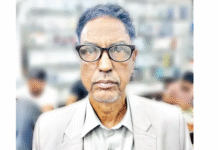Special Correspondent
Democracy seems to have turned a full circle in Bangladesh, we are now solidly back to the pre 1990 era. That was a time when state power was used wantonly to ensure that the ruling coterie continued to stay in power regardless of the wish of the electorate. Pro forma elections were held and it was business as usual thereafter. However, the average duration of these governments were usually around ten years.
Full Story
Special Correspondent
Democracy seems to have turned a full circle in Bangladesh, we are now solidly back to the pre 1990 era. That was a time when state power was used wantonly to ensure that the ruling coterie continued to stay in power regardless of the wish of the electorate. Pro forma elections were held and it was business as usual thereafter. However, the average duration of these governments were usually around ten years.
Pakistan was created in 1947 of which Bangladesh was then a part, known as East Pakistan. Pakistan was ruled by West Pakistanis with a few compradors from East Paskistan who were satisfied that as long as their masters in Karachi were satisfied with their performance in supporting the West Pakistani exploitation of the resources of East Pakistan, their frolics were safe. Unfortunately for the then rulers, they were so busy with the business of staying in power that they rode over the wishes of the people with brute force even if they came up with genuine demands. The 1952 Language Movement is a case in point.
Ayub’s Martial Law
This lasted until 1958 when Md. Ayub Khan, a self proclaimed Fiend Marshal, upset the Pakistani apple cart and introduced the Pakistani army into politics of the country. The rulers had become so detached from the people that when Ayub overthrew the government, there was not even a whimper from any quarter. In order to ensure his grip on power Ayub decided to bar from politics all those whom he considered to be threats to his ambitions. Towards this end he promulgated the Electoral Bodies Disqualification Order (EBDO) which disqualified all those whom he considered to be the true representatives of the people. He recruited renegades from the Pakistan Muslim League and formed his own version of that party.
Ayub Khan ruled for more than ten years, wrote a book called “Friends, Not Masters” in which he forwarded his own version of history and encouraged that this book be made a text in appropriate educational institutions. He adorned himself with the highest civil and military awards and even celebrated what he called a Decade of Development which highlighted what he called the tremendous progress the country had made under his leadership. Unfortunately for him, the people were not impressed by his claims and overthrew him in 1969 through a mass uprising, which in turn was commandeered by the Pakistan Army under Yahya Khan. The period under Yahya Khan was the darkest period of this country which culminated in the glorious Liberation of this country from the shackles of the Pakistani oppression.
The post Liberation government was rudely interrupted by a putsch led by party renegades under the leadership of Khandakar Mustaq Ahmed whose government lasted for less than three months and unseated by a mass uprising which ushered in the era of Ziaur Rahman in November, 1975. Ziaur Rahman was assassinated in 1981 which was followed by the government of Abdus Sattar. Abdus Sattar was removed from power by Hussain Muhammad Ershad in 1982. This add up to about ten years for the post Liberation governments of Sheikh Mujibur Rahman and Ziaur Rahman.
Ershad ruled till 1990, depended largely on dispensing largess to targeted individuals to stay in power. This essentially meant that he gave little importance to the wishes of the people and even then managed to stay in power for about eight years. He however had to surrender to a mass uprising led jointly by the Awami League and the Bangladesh Nationalist Party.
Emergence of democracy
The next twenty two years have been shared evenly by BNP and Awami League. Six elections have been held since 1991, four with and two without popular participation. These too were evenly shared by the two aforementioned parties.
The record of the parties that ruled for close to ten years each has not been very good. The ruling coterie that was in power up to 1958 have been lost in history, the Muslim League that was in power up to 1969 has joined its predecessors in oblivion, Ershad exists in palace intrigues and those whom he considered as vanquished have succeeded him in state power.
The Awami League has begun its contiguous term in power and is headed towards its ten year term. It is most likely that all those who tried to stay beyond their initial welcome, i.e., term did not do so with the mandate of the people. The history of Bangladesh has treated them most unkindly. One can only hope that history will treat the incumbent less harshly than its predecessors who tried to stay in power for beyond five ten years.
Source: Weekly Holiday









